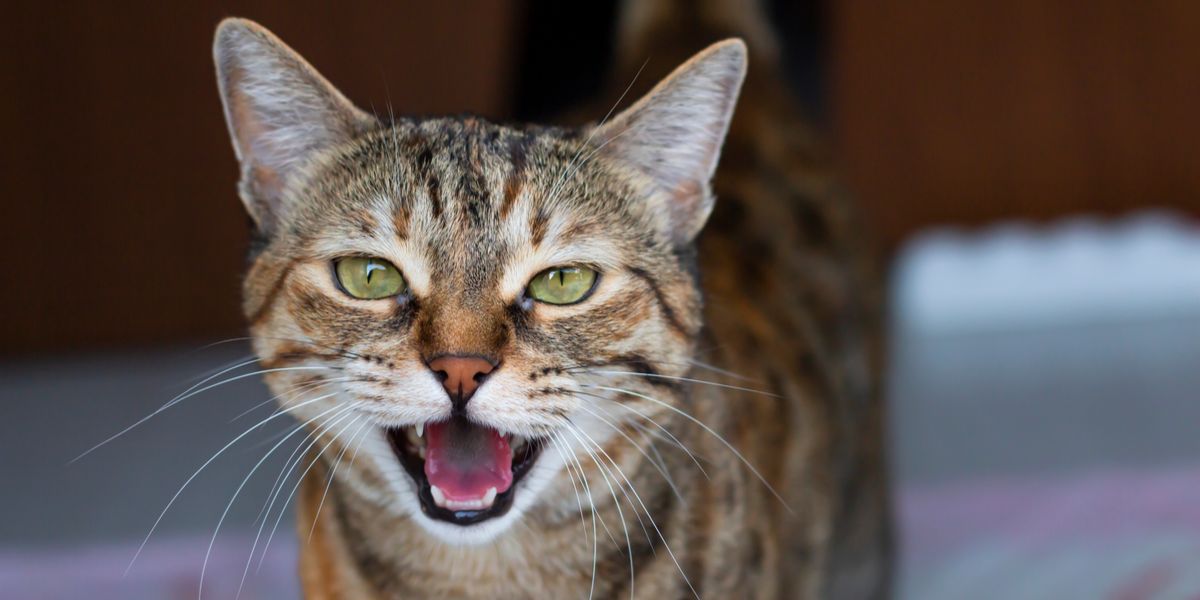
Anyone who has a cat knows they have many ways to communicate with us: including the beloved purr, meowing, jumping in our face, knocking things off counters, and weaving between our legs when we try to walk. But nothing gets our attention like the sound of a cat caterwauling, especially when it’s in the middle of the night!
So what causes this awful yowling? Cats may produce this dramatic, loud vocalization for attention, when they’re in heat, or due to a behavioral or medical problem. Read on to learn more about these causes, and how to help!
Caterwauling is a feline yowling noise which tends to be loud, repeated, and dramatic Caterwauling is usually done for attention, by cats in heat or due to medical or behavioral causes Use enrichment to keep cats occupied, neuter cats who are entire and seek veterinary attention for medical or behavioral concernsKey Takeaways
What Is Caterwauling?
Caterwauling is a very interesting word that may not be familiar to some people. The origin of “caterwaul” comes from the Middle Dutch term “cater” which means tomcat and the Middle English term “waul”, which means to yowl.
A caterwaul is different from a meow or a purr. It is a shrill and often loud vocalization made by a cat. Some cats sound like they are crying out in pain and most people find this vocalization very unpleasant. When the noise is repeated over and over again in a short period of time, it is referred to as caterwauling.
Causes of Caterwauling
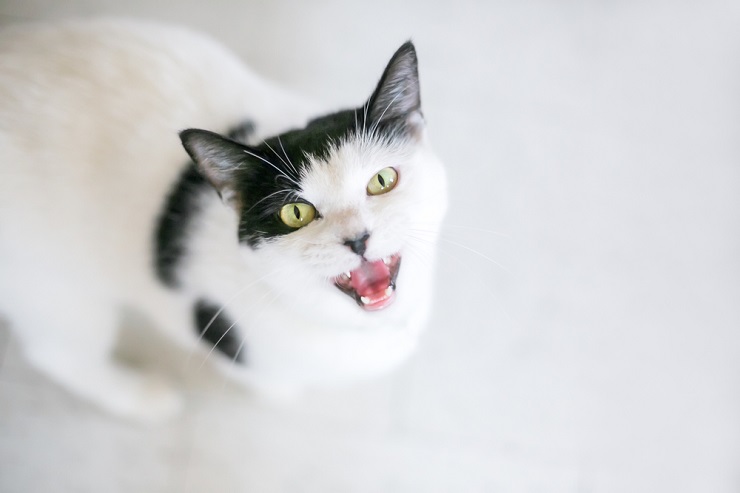
The long yowling howl of a caterwauling cat can make it seem like they’re in pain – but there are other causes too.
Caterwauling can be an alarming noise to hear from your cat, with many owners worrying that their kitty is in pain. However, there are a variety of reasons why you might hear this dramatic, drawn-out noise from your cat.
Attention Seeking
With some cats, caterwauling is just simply a way of saying “pay attention to me!”. They may caterwaul to let us know their food bowl is empty, their litter box needs cleaning, or you have been gone too much lately and they are lonely.
Heat (Estrus)
If you have a young female cat, the most common cause of caterwauling is the start of estrus, or heat. Your pet’s caterwauling is a mating call. Female cats can have their first heat cycle when they reach puberty, anywhere from four months to a year of age, but for most kittens it is around six months of age. Once a female cat starts going into heat, she will continue to have multiple heat cycles during the breeding season, until she becomes pregnant.
Health Conditions
There are various medical problems that can cause this unpleasant vocalization. Here are some common reasons for cats to caterwaul if unwell:
- Urinary problems: if the caterwauling is happening while in the litterbox, the underlying cause may be a urinary tract infection, constipation or even a urinary obstruction. If your cat is unable to pass urine when they visit the litter box, seek veterinary attention urgently.
- Pain: some health problems, such as arthritis, can cause chronic pain and mobility issues.
- Hyperthyroidism: excess thyroid hormone makes cats feel confused, uncomfortable, and hungry all the time
- Kidney disease: a decrease in kidney function means the body is not filtering toxins out of blood as efficiently and this leads to gastric ulcers, nausea, and increased thirst and urination
- High blood pressure: elevated blood pressure can lead to signs of anxiety including restlessness and increased vocalizations
- Cognitive dysfunction (dementia): as cats age, they can lose cognitive ability and become confused and disorientated. Caterwauling can be a sign of feline dementia, often occurring at night time.
If you’re concerned about your cat’s caterwauling, it has come on suddenly or markedly increased, then it’s time to visit your veterinarian.
Behavioral Problems
Behavioral problems can also lead to caterwauling.
Some cats are very territorial. If a new cat moves into the neighborhood and starts roaming the streets, your cat may become agitated and caterwaul to warn the new cat to get out of their territory. This may also occur with wild animals wandering into the yard, such as raccoons or skunks. Some cats are even territorial towards humans and become upset when an unfamiliar person enters the house. Introducing a new pet or family member can be a big adjustment for our territorial feline companions.
Occasionally, caterwauling can occur with separation anxiety, disputes in multi-cat households and as a precursor to aggression in some circumstances.
What You Can Do
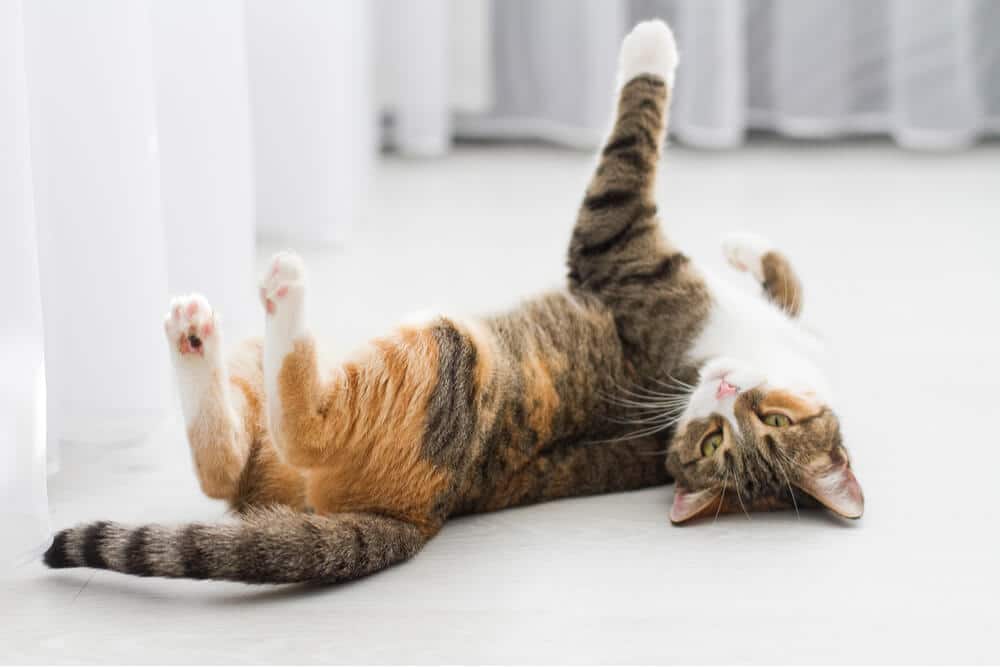
Spaying a female cat will stop her heat cycles, and the accompanying behaviors such as caterwauling, rolling around on her back and trying to escape.
It can be upsetting, worrying and frustrating to have a cat who caterwauls. It’s an unpleasant noise, and may indicate that there’s something amiss. Luckily, there are some handy tips for how to help your cat if you have a caterwauling companion!
Get a Vet Check
As caterwauling can be a sign of pain or illness, it’s highly recommended to take a trip to your veterinarian if you hear this noise. This is especially relevant if your cat has suddenly started caterwauling. Your vet will be able to perform a full physical examination, as well as any bloodwork or urine tests that may be necessary.
Considering Spaying
One of the most common reasons for caterwauling is a female cat in heat. If you’re not planning on raising a litter of kittens (or two, or three!), then having this procedure done is a responsible decision. Having a female cat spayed reduces their likelihood of certain cancers and infections, eliminates the behaviors associated with estrus, and is important for population control.
Enrichment
If your cat is neutered, and has no health concerns, then the caterwauling is likely to be attention-seeking or other behavioral concern. This can be difficult to manage, but there are ways to help.
- Provide plenty of exercise and stimulation, such as climbing trees, interactive games and puzzle feeders
- Schedule time to spend with your cat, through grooming, play or cuddles, to satisfy their need to be close and bonded to you
- Try Feliway or calming aids to encourage more restful behavior
- Follow our guide to introducing new pets, if your cat is showing territorial behavior
If your cat has always been prone to caterwauling, this may be part of their usual communication strategy. Cats who suddenly start showing this noisy behavior may be of more concern, as this may indicate that something has happened to cause stress or pain.
Frequently Asked Questions
Why do cats caterwaul?
Your cat is caterwauling to gain attention. It may be the attention of another cat if they are looking for a mate or if another cat has entered their territory. It may be the attention of the cat’s humans to alert them that they need something, or are in pain, confused, or have a medical issue.
What sound is a caterwaul?
Caterwauling is a wailing, yowling sound. Often quite loud, this vocalization is similar to a long drawn out howl mixed with a whine or a cry. Cats often repeat the sound multiple times in a short period.
Do male or female cats caterwaul?
Both! Intact males caterwaul if they can sense a female in heat, and intact females caterwaul when in estrus to attract males. Both males and females can also caterwaul for attention, when ill or in pain or due to a behavioral problem.

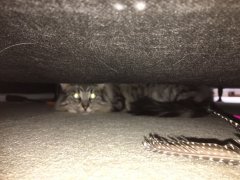
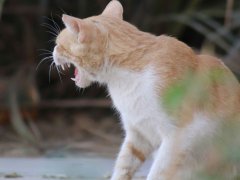
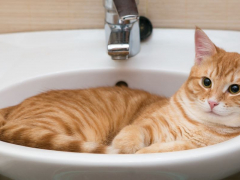

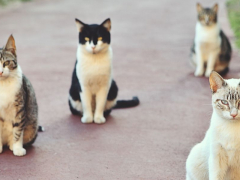
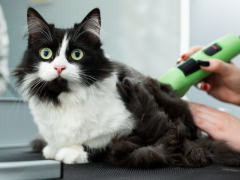
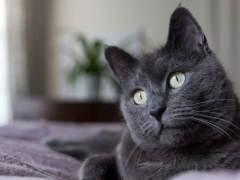
My cat does this when he thinks he is alone. I think it’s a form of separation anxiety. He will pick up a toy & go up and down the hallway “singing” away. Mostly at night, but even if we’re outdoors in the daytime. Anytime he thinks he’s alone. He was neutered at 3 months & is now 4 years old. We have no behaviorist in our area. It’s been worse since we lost our senior cat. Any ideas?
Hello Pat, thanks for your patience—I know it’s been a while since you commented! It’s normal for some cats to make excited vocalizations while they’re playing, so I wouldn’t assume that the singing up and down the hallway with a toy is due to separation anxiety. However, if it’s increased since you lost your other cat, anxiety could have something to do with it. To address this, I would focus on creating an extremely consistent routine for him and enriching the environment. Ensuring that he has plenty of things to scratch, hunt, and climb should help to alleviate some of that stress. You can learn more about separation anxiety in cats here.
I’m a first time cat owner and are cats suppose to meow all time mine rarely does mine and it’s soft STASH is about 4 or5 yrs old I want to know all about my cat do you have any suggestions or where I can read I would really appreciate it.